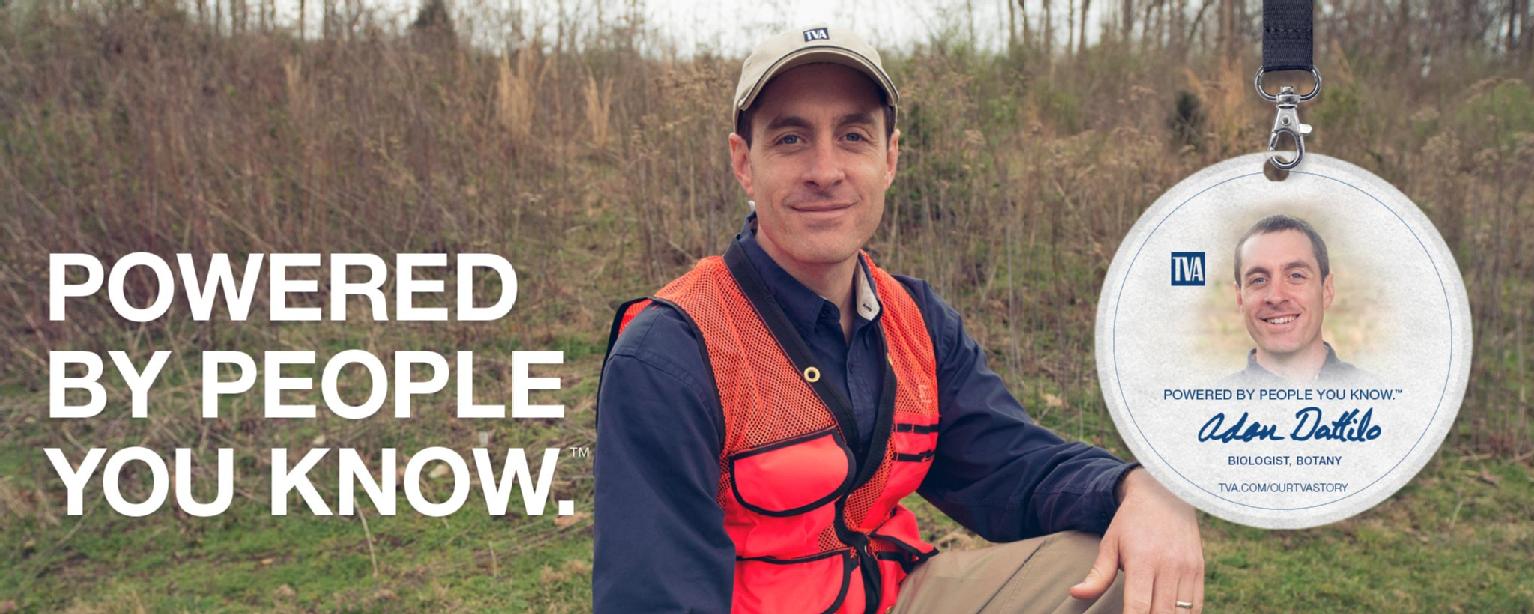Adam Dattilo
Botanist | Knoxville, Tenn.
“I’m married to an environmental educator who taught me about wildflowers. My family and I are avid campers. The natural world has always been an important part of my life.”
Adam Dattilo is a proud champion for threatened and endangered plant species in the Tennessee Valley. It’s part of his job, yes, but also a closely held personal value.
“I see it as a great service to the people who live here,” says Dattilo, TVA’s only botanist. “Given the extent of our operations and the amount of land we manage, we’re in a position to play a leadership role in conserving resources that might otherwise die out. I feel fortunate to be a part of that effort.”
Dattilo works in the Biological and Cultural Compliance group in TVA’s Safety, River Management & Environment division. He says his group works with just about everyone in TVA.
“We get involved whenever there’s a possibility for a project to affect a threatened and endangered species or their habitat—whether it’s a transmission project, a landfill project at a fossil plant or an economic development project,” he explains. “We go out to the project site and collect data about threatened and endangered species and then provide input to the documents required for compliance with the Endangered Species Act.”
Dattilo and his colleagues also monitor threatened and endangered (T and E) species on TVA property or in areas that might be affected by TVA operations. Keeping good records is a crucial part of his job, Dattilo says.
“Monitoring helps us establish a baseline so we can track changes over time,” he notes. “I might go out today and see a very rare plant growing in a crevice of a rock—a rock that is covered by ivy and shaded by a lot of trees—and conclude that the plant is being choked out. Ten years later, someone else can see the same plant on the same rock and draw the same conclusion. But, if the second person knew what I saw, he or she would conclude that the plant population is stable. That’s why recording data is so important.”
Dattilo is emphatic on one point: it isn’t enough to look at T and E species from an academic standpoint.
“Collecting data about T and E plant populations on TVA public lands is only part of my job. I also need to be able to communicate what I see and learn and to relate the biology to TVA operations. To achieve conservation goals, I need to understand the goals of the groups we work with.”
The best solution, says Dattilo, is to “nest” conservation of T and E species with overall operations. This can, at times, make achieving conservation goals surprisingly easy.
“There are a lot of things we can do—conservation measures that don’t always require a lot of effort—that have significant conservation benefits," Dattilo says. "Our efforts to control the growth of trees and shrubs along transmission line rights-of-way, for example, can be extremely beneficial to leafy prairie clover, native wildflowers and other T and E plant species that require open prairie-like habitat. Our power line corridors offer some of the only prairie-like habitat left in the region.”
In his spare time, Dattilo plays the guitar and goes rock climbing whenever he gets the chance. But most of his time is spent being a dad, he says.
He and his wife, Clare, have three children: Oliver is 10, Annabel is 8 and Fern just turned 3.
In this capacity, Dattilo joyfully brings his love of the natural world home from the office. “Clare and I share an appreciation of the natural world, and we are trying to instill that in our kids. We spend a lot of family time outdoors, where it is quiet, where there are no screens to look at, where we can act more human.”
Meet More People You Know
Meet more TVA employees, and learn about some of the fascinating ways they serve the Tennessee Valley through their work in energy, environmental stewardship and economic development.
They’re your friends, your family, your neighbors. Get to know them.
